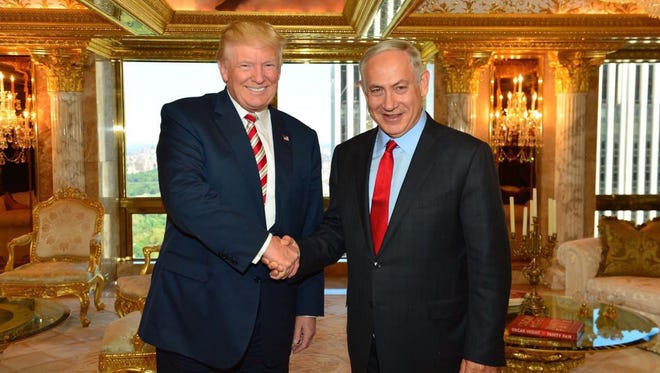Candidate Trump's embrace of Israeli policies may ease once he's president

In a break from long-standing U.S. policy, Donald Trump has embraced many of Israel's positions in its dispute with the Palestinians, but how far he will go is unclear.
Trump has said he would like to move the U.S. Embassy from Tel Aviv to Jerusalem, a provocative act to Palestinians. His campaign's top Israel advisers said Jewish settlements on land Palestinians want for a future state — considered illegal by the Obama administration — are not an obstacle to peace. And they say a President Trump would stop funding the United Nations Human Rights Council, which has singled out Israel for disproportionate condemnation.
The United States keeps an embassy in Tel Aviv because Israel annexed the eastern half of its capital, Jerusalem, after seizing it and other territories during a war in 1967. Israel claims rights to Jerusalem dating back to biblical times, but Palestinians want east Jerusalem as their own capital. Since the war, U.S. presidents have declined to move the embassy. U.S. policy also considers Israeli settlements in east Jerusalem and the West Bank illegal because it wants the status of the land decided by negotiations on the boundaries of a Palestinian state.
Trump, who gave an Israeli newspaper, Israel Hayom, his first foreign press interview after his election, told the paper Friday: “I love and respect Israel and its citizens.”
The president-elect called Israel the one true democracy and defender of human rights in the Middle East. He told The Wall Street Journal that he would like to negotiate peace between Israel and the Palestinians to end "the war that never ends."
“That’s the ultimate deal,” Trump said.
U.S. $38B military aid package to Israel sends a message
Trump's warmth toward Israel would be a change after eight years of President Obama, who knocked heads with Israeli Prime Minister Benjamin Netanyahu over settlements and the Iran nuclear deal, which Netanyahu vehemently opposed.
Trump appears ready to take a hands-off approach to Israel and its treatment of Palestinians, which will contribute to a sense of desperation, said Yousef Munayyer, executive director of the U.S. Campaign for Palestinian Rights.
"That’s very dangerous for the Palestinians and creates incentives for violence that we haven’t seen for a very long time," Munayyer said. "For Palestinians living under occupation, this is the definition of no hope."
Such violence has already occurred because of anger over Israel's continued control of Palestinian territory. A wave of Palestinian attacks, mostly by knife, that began in September 2015 has resulted in the deaths of more than 40 Israelis and tourists, according to Israel's Ministry of Foreign Affairs. More than 224 Palestinians have been killed by Israeli fire, most of them said by Israel to be attackers, the Associated Press reported.
Ancient papyrus offers first non-biblical mention of Jerusalem
A U.S. policy shift that embraces Israeli positions on controversial issues such as Jerusalem and settlements would risk putting the U.S. at odds with its European, Arab and Muslim allies in the global fight against terrorism, while boosting terrorist recruitment by the Islamic State and other extremists, said Mia Bloom, a terrorism analyst at Georgia State University.
"This would be the spark to cause heavy Palestinian recruitment," Bloom said, referring to Trump's statements about moving the capital to Jerusalem.
Israeli president congratulates Trump on his election
In September, Trump told Netanyahu that as president he would “recognize Jerusalem as the undivided capital of the state of Israel.” After the election, one of Trump's advisers said such a move would have to wait.
“Many presidents of the United States have committed to do that, and (Trump) said as well that he will do that, but he will do it under consensus,” Walid Phares, a foreign policy adviser to the president-elect, told the BBC on Thursday. Phares did not explain whose consensus would be needed.
Jason Greenblatt, co-chairman of the Trump campaign’s Israel Advisory Committee, said Trump doesn't have a problem with Israeli construction on territory that Palestinians want for a future state.
“It is certainly not Mr. Trump’s view that settlement activities should be condemned and that it is an obstacle for peace, because it is not an obstacle for peace,” Greenblatt told Israel's Army Radio.
Trump's departure from U.S. settlement policy was evident Monday, after Israel’s parliament advanced a bill that would legalize an illegal outpost slated for removal in the West Bank. State Department spokeswoman Elizabeth Trudeau said the proposed legislation "could pave the way for the legalization of dozens of illegal outposts deep in the West Bank ... (and) would be a dramatic advancement of the settlement enterprise, which is already gravely endangering the prospects for a two-state solution.”
Jonathan Schanzer, vice president of research at the Foundation for Defense of Democracies, a hawkish think tank in Washington, said there is also a risk of upending quiet diplomacy that has been proceeding between Israel and its Arab neighbors. Much of that has been prompted by the common perceived threat from Iran, which is simultaneously expanding its support for militants across the region and its economy, recently unfettered by the nuclear agreement reached with the U.S. and five other world powers.
"By all accounts the Arab world has been engaging with Israel more than it ever has," Schanzer said. "Sudden moves on the Israel-Palestinian front could scuttle any developments that have been made."